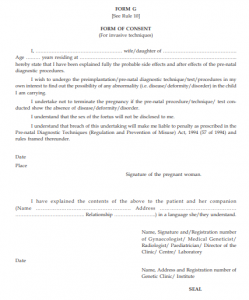The law prohibits the following activities:
Conducting sex selection
Nobody, including infertility specialists, can conduct sex selection on a woman or a man or on both, by using any tissue, embryo, conceptus, fluid or gametes derived from either or both of them.(( Section 3A, Pre-conception and Pre-natal Diagnostic Techniques (Prohibition of Sex Selection) Act, 1994.))
The law also prohibits anybody, including a relative or husband of a woman, from seeking or encouraging any sex selection procedures on either or both of them.(( Section 4(5), Pre-conception and Pre-natal Diagnostic Techniques (Prohibition of Sex Selection) Act, 1994.))
Conducting prenatal diagnostic procedures
No place, including a registered centre, can be used by any person for conducting prenatal diagnostic procedures or tests, except for certain permitted situations.(( Section 4(1),Pre-conception and Pre-natal Diagnostic Techniques (Prohibition of Sex Selection) Act, 1994.))
The law also prohibits anybody, including a relative or husband of the pregnant woman, from seeking or encouraging the conduct of any prenatal diagnostic procedures or tests on her, except for certain permitted situations.(( Section 4(4),Pre-conception and Pre-natal Diagnostic Techniques (Prohibition of Sex Selection) Act, 1994.))
Determining the sex of the foetus
Nobody, including a registered centre, can conduct any prenatal diagnostic procedures for determining the sex of a foetus.(( Section 6,Pre-conception and Pre-natal Diagnostic Techniques (Prohibition of Sex Selection) Act, 1994.))
If a sex determination procedure results in the abortion of a child, it would be a crime of foeticide.
To know more about the law on abortion, please read our explainer.
Communicating the sex of the foetus
Nobody can communicate the sex of the foetus to the pregnant woman, her relatives or any other person, by words, signs or in any other manner.(( Section 5(2), Pre-conception and Pre-natal Diagnostic Techniques (Prohibition of Sex Selection) Act, 1994.))
Selling machines for sex determination
Nobody can sell any ultrasound machine, imaging machine, scanner, or any other equipment that can detect the sex of a foetus to anyone not registered under the law.(( Section 3B, Pre-conception and Pre-natal Diagnostic Techniques (Prohibition of Sex Selection) Act, 1994.))
Advertising sex determination or sex selection facilities
Nobody can issue, publish, distribute or communicate anything online or offline about the availability of facilities of prenatal determination of sex, or sex selection, before conception.(( Section 22, Pre-conception and Pre-natal Diagnostic Techniques (Prohibition of Sex Selection) Act, 1994.))
